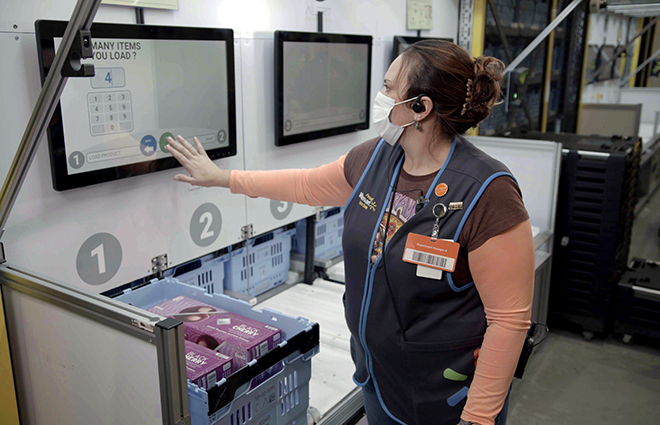S&P Global Offerings
Featured Topics
Featured Products
Events
S&P Global Offerings
Featured Topics
Featured Products
Events
S&P Global Offerings
Featured Topics
Featured Products
Events
Banking & Capital Markets
Economy & Finance
Energy Transition & Sustainability
Technology & Innovation
Podcasts & Newsletters
Banking & Capital Markets
Economy & Finance
Energy Transition & Sustainability
Technology & Innovation
Podcasts & Newsletters
S&P Global Offerings
Featured Topics
Featured Products
Events
28 Dec, 2021

A Walmart associate interacts with a screen at a company fulfillment center.
Amazon.com Inc. and other U.S. e-commerce retailers are likely to pursue deals in 2022 that will further bolster their digital and technology capabilities, a move experts say will help them tighten their grasp on higher levels of online sales in the new year.
Amazon, Walmart Inc. and Target Corp. have emerged as beneficiaries of the pandemic, thanks largely to investments they have made in areas such as delivery, fulfillment and curbside pickup operations.
The investments they make in 2022 will help them further capitalize on online sales as well as drive demand and efficiencies in areas such as content, delivery and supply chain, said Tim Campbell, director of industry insights at e-commerce management platform CommerceIQ.
"With e-commerce, they have the reach, and now it's about making it better," Campbell said. "I think that's going to be the trend of 2022."
One of the biggest deals that could advance next year is Amazon's planned $10.56 billion acquisition of film and television company MGM Holdings Inc. It would mark the company's second-largest acquisition behind Amazon's 2017 purchase of Whole Foods Market Inc. for $14.62 billion.

An Amazon spokesperson told S&P Global Market Intelligence that completion of the MGM deal announced in May is "subject to regulatory approvals and other customary closing conditions, and we're working with regulators to respond to requests."
The Federal Trade Commission is investigating the deal but declined to comment for this story.
If approved, the deal would arm Amazon with a content library that includes more than 17,000 TV shows and 4,000 film titles, including the popular James Bond and Rocky franchises. The deal would also give Amazon more exclusive content to further lock consumers into Prime subscriptions, said Wade Holden, senior research analyst with Kagan, a media research group within S&P Global Market Intelligence. "They will be able to say 'if you want to stream all these thousands of titles, they are here on Prime if you want to subscribe,'" said Holden, who focuses on the motion picture industry.
However, the deal faces opposition from several activist groups that have pleaded with the FTC to block the transaction, saying the acquisition is anticompetitive and would enable Amazon to further leverage its dominance in streaming over competitors including Netflix Inc. and Walt Disney Co.'s Disney+ streaming service.
With MGM's massive catalog of content potentially exclusive to Prime Video, the e-commerce giant has much more incentive to hurt Netflix if Amazon wants to gain market share in video streaming, said Alex Petros, policy counsel for Public Knowledge, a Washington, D.C.-based nonprofit public interest group. He noted that Amazon's cloud-computing unit, Amazon Web Services Inc., is already the back-end cloud provider for Netflix and other streaming companies, and it could raise cloud service prices if the MGM deal closes.
"Amazon has been really aggressive about leveraging its market power in one segment to increase market power in another segment," Petros said. "Adding on MGM to that dominance would really create a competitive chokepoint."
Meanwhile, Walmart could be eyeing a deal to further bolster its position in automation in 2022. The Arkansas-based retailer this year announced plans to partner with Symbotic LLC to pilot a new robotics system that sorts and packs freight onto pallets. It may pursue similar investments or partnerships in the new year, said Brandon Fletcher, an analyst with AB Bernstein.
Fletcher said he would not be surprised to see the retailer purchase an automation system analogous to Amazon's Kiva robot technology, in which mobile robots transport shelves of product to workers in fulfillment centers.
Walmart did not comment on whether it might pursue an investment or acquisition of a robotics system in 2022, but at a Dec. 2 company conference, Walmart CFO Brett Biggs said the retailer is "investing in fulfillment centers and automation" and other initiatives that will enable growth.
Arun Sundaram, senior equity research analyst with CFRA, said Walmart may also look to invest in systems that will allow it to standardize its technology across distribution centers and stores. The technology Walmart uses in its distribution centers to scan goods and pallets is currently "completely different" from the technology it uses in stores, which has led to complexities in its supply chain, he said.
|
Target stores serve as local fulfillment hubs. |
Target, a much smaller yet growing rival of Walmart and Amazon, is also poised to further invest in fulfillment services and supply chain capacity in 2022.
Earlier this year, the Minneapolis-based retailer said it planned to invest approximately $4 billion in each of the next few years to support new and remodeled stores, supply chain projects and new sortation centers that support Target's stores-as-fulfillment-hubs strategy. In a third-quarter conference call, Target executives said they would invest between $4 billion and $5 billion in 2022 largely to help build out supply chain capacity and support sortation center growth.
Target's recent acquisitions have focused on the delivery side, including the retailer's 2017 deal to purchase Shipt Inc. that gave it same-day shipping capabilities and its 2020 deal to purchase technology of last-mile delivery service Deliv Inc. Target's new investments will build on those fulfillment capabilities and help the company further compete with larger retailers, said CommerceIQ's Campbell.
"Looking at the pandemic, Target was really well-positioned," he said. "Their growth was insane even in comparison to other big players."
AB Bernstein's Fletcher said he also sees potential for Target to pursue an acquisition or partnership with a grocer next year. Target does not attract nearly as much traffic from food as a retailer like Walmart, but partnering with a regional grocer like Wegmans or boutique grocer like Dean & DeLuca could help it catch up to major grocery players.
Target did not respond to inquiries about a partnership with a grocer, but CFRA's Sundaram said he would not be surprised if Target pursued a deal in the grocery arena. Target's U.S. grocery market share is around 3% while Walmart's share is 25%, he said, adding that he expects more consolidation in the U.S. food retail industry over the next few years.
"Retailers need to scale grocery e-commerce to make it more profitable, and so the quickest way to generate scale is through acquisitions," Sundaram said.

